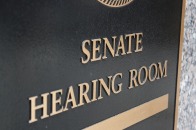Senate Confirmation of a Supreme Court Nominee: An Online Deliberation
Introduction
Informed citizens make decisions about their governments and leaders at the voting booth, serve as wise participants on juries, and keep abreast of politics on a routine basis. In order for our students to be informed citizens, they must be able to develop informed opinions.
Most social science classes involve discussions or deliberations about controversial issues. However with the advent of Web 2.0, there are new tools available, such as VoiceThread or Skype, to use for student assessment. These tools allow for differentiated instruction for students who rather speak than write.
Most social science classes involve discussions or deliberations about controversial issues. However with the advent of Web 2.0, there are new tools available, such as VoiceThread or Skype, to use for student assessment. These tools allow for differentiated instruction for students who rather speak than write.
Essential Questions

- Should a Supreme Court nominee's life experiences, ideals and beliefs be used when interpreting the Constitution (or should the Constitution be interpreted at face value, literally)?
- Should a nominee's views on a particular issue disqualify that person from serving as a Supreme Court justice?
Objectives
Students will be able to
- Evaluate the criticisms of and support for nominee Sotomayor by taking part in a Voice Thread discussion of political cartoons about the controversial issues involved in a Senate judicial confirmation process.
- Assess the setting and point of view of the given photographs, imagine the possible dialogue of the principle figures in each photograph, and share their thoughts in a VoiceThread discussion.
- Analyze the controversial issues involved for Republican Senators in the nomination of Judge Sotomayor to the Supreme Court and what the political implications are for Republicans opposed to her nomination.
- Determine the characteristics that President Obama seeks in his judicial nominations.
- Determine the characteristics that the current Senate seeks in providing “advice and consent” to a president’s judicial nominee.
- Predict the types of questions and issues that the current Senate might be asking in the confirmation hearings for nominee Sotomayor.
- Justify an argument about whether a Supreme Court nominee should use their life experience or other resources (e.g. precedent) when interpreting the Constitution vs. a literal translation by using Skype to deliberate viewpoints with students from out of state.
Prior Knowledge

Prior to the beginning of this lesson the learner should:
- Know the expressed and implied powers of the executive (president), legislative (Congress), and judicial branch (Supreme Court).
- Identify and explain the functions and powers that the Senate and Senate Judiciary Committee posses in conjunction with a president’s judicial nomination.
- Identify and explain the reasoning of the Founders for separating the branches of government in the Constitution and how one branch can “check” and, as a result, “balance” the other by investigating Pres. Obama’s nomination of Sonia Sotomayor to the Supreme Court
- Identify and explain past controversies with judicial nominees (e.g. Clarence Thomas, Robert Bork)
Culminating Activity
Students from two different classes in two different states will take part in an online Skype deliberation about the following controversial issue:
Should a Supreme Court nominee's life experiences or other ideals/beliefs be used when interpreting the Constitution? (or should the Constitution be interpreted at face value, literally?
Should a Supreme Court nominee's life experiences or other ideals/beliefs be used when interpreting the Constitution? (or should the Constitution be interpreted at face value, literally?
Project Elements
1. VoiceThread discussion (days 1-2
2. Research major discussion topics (days 3-4)
3. Skype deliberation (day 5)
2. Research major discussion topics (days 3-4)
3. Skype deliberation (day 5)
Pitfalls Anticipated
• If a student fails to do the research, they must sit on the sidelines of the discussion and take notes on what they hear for
any credit (similar to the job of a court reporter).
• If a student doesn't show up on the day of the discussion, an alternative assignment (an essay) about the same essential
question would be assigned to them.
• Not every student in the Skype deliberation may have the opportunity to speak; hopefully the time limit and ground rules
will reduce students from dominating the discussion. Therefore, it is essential that the moderator pays close attention to
the clock and enforce time limits. A good rule of thumb would be to have a timer to remind the teacher and students about
the importance of this. If not every student has the opportunity to speak, the Skype deliberation can be extended to
another day.
• Technical issues may arise from Voice Thread or Skype not functioning correctly. Teachers should make sure that both
websites are running correctly the day of the TCL activity.
any credit (similar to the job of a court reporter).
• If a student doesn't show up on the day of the discussion, an alternative assignment (an essay) about the same essential
question would be assigned to them.
• Not every student in the Skype deliberation may have the opportunity to speak; hopefully the time limit and ground rules
will reduce students from dominating the discussion. Therefore, it is essential that the moderator pays close attention to
the clock and enforce time limits. A good rule of thumb would be to have a timer to remind the teacher and students about
the importance of this. If not every student has the opportunity to speak, the Skype deliberation can be extended to
another day.
• Technical issues may arise from Voice Thread or Skype not functioning correctly. Teachers should make sure that both
websites are running correctly the day of the TCL activity.
